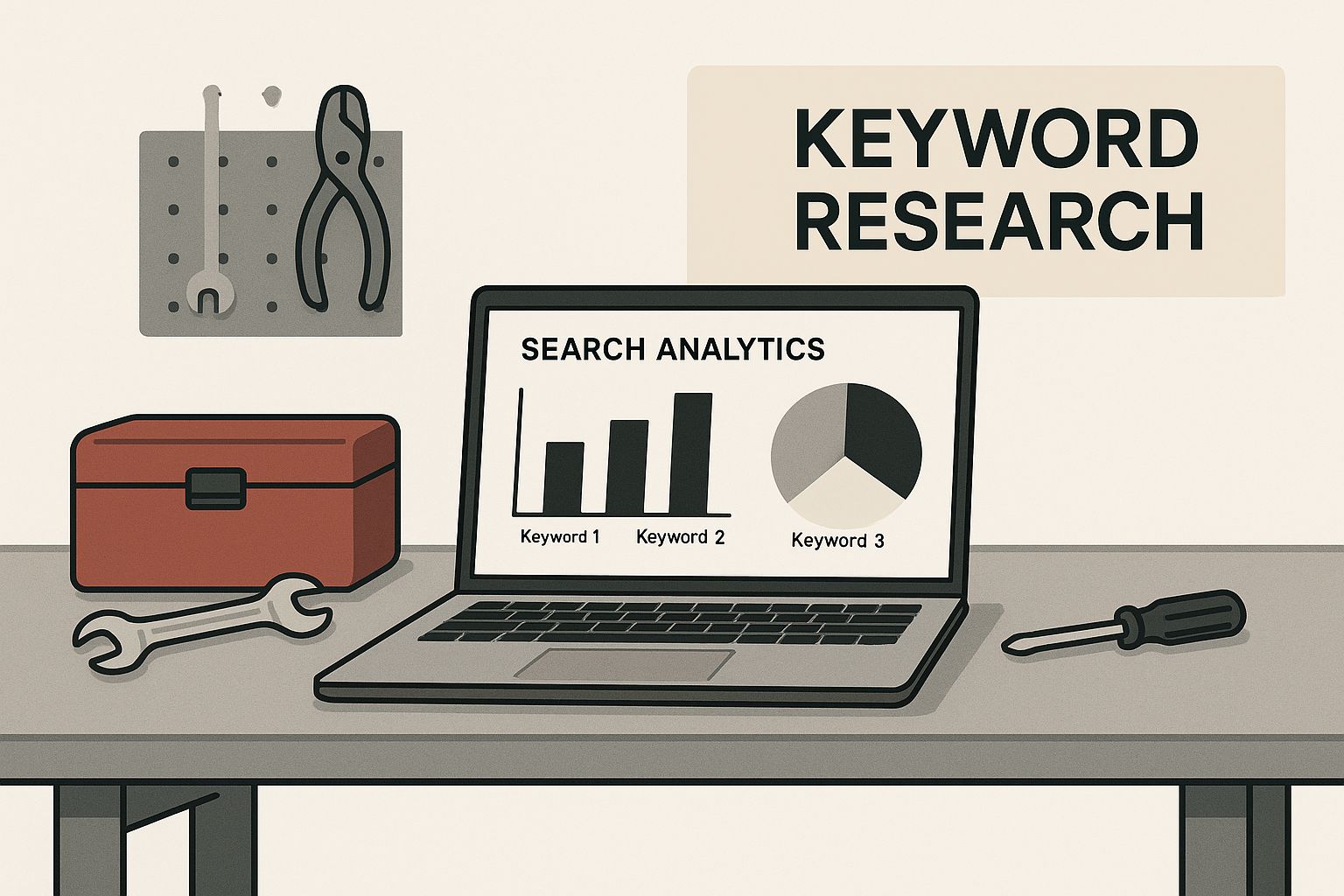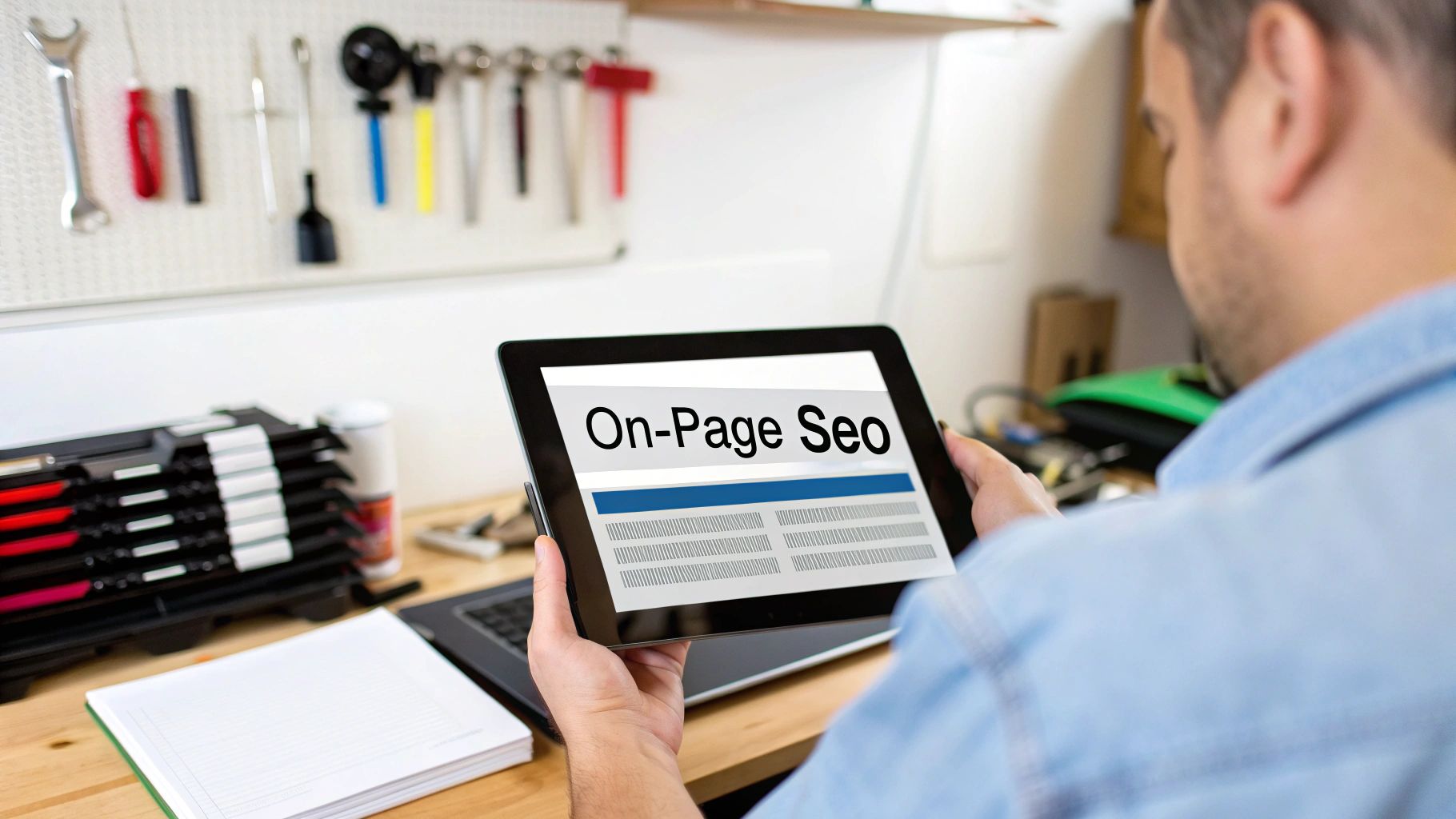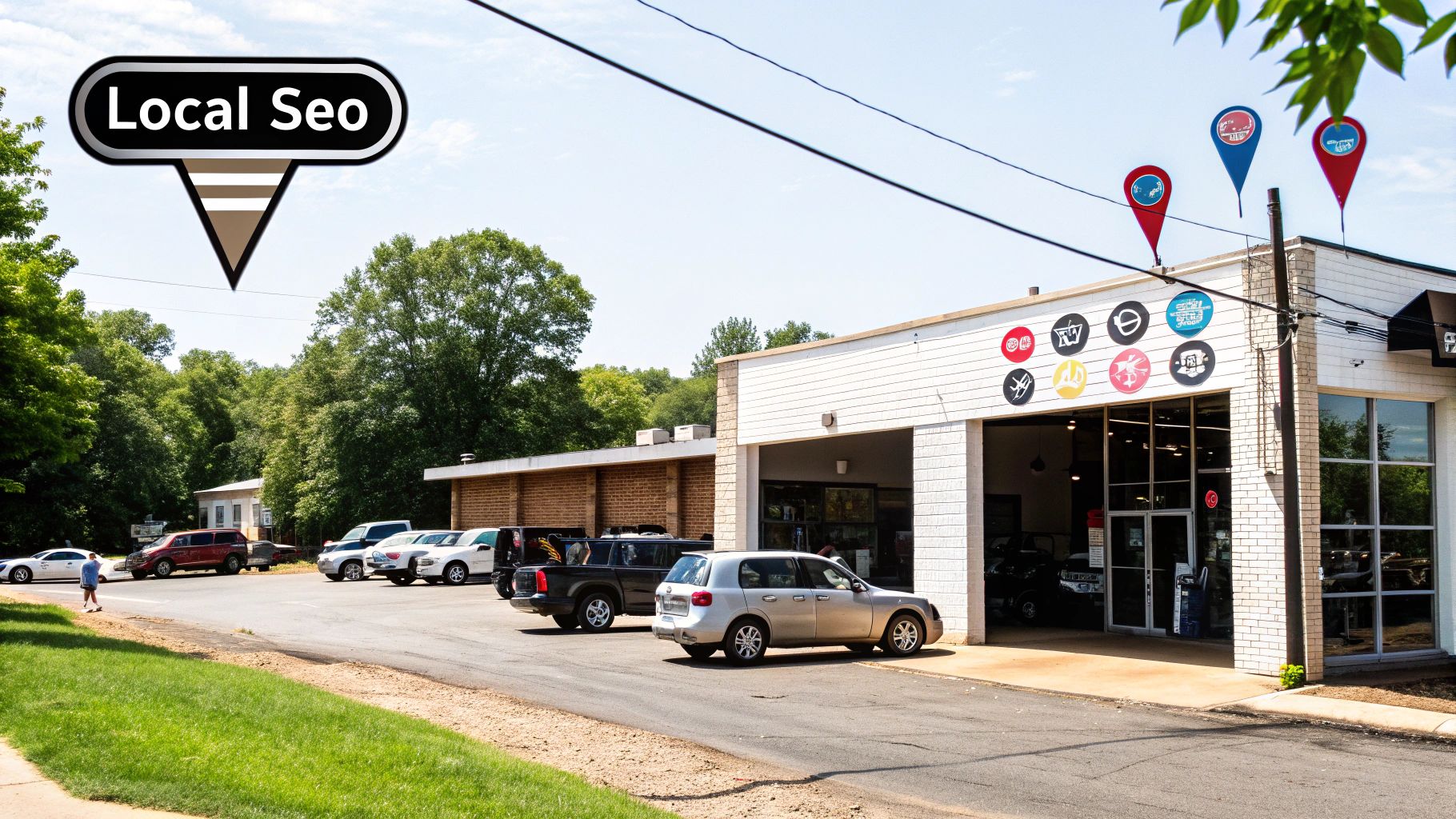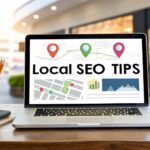Let's get straight to it. If a local driver can't find your shop on Google, you're practically invisible. For today's auto repair shop owner, SEO isn't some fancy tech buzzword; it's the most direct line you have to people searching for a mechanic on their phones right now.
Think of it as your best tool for turning online searches into real, paying customers pulling into your service bays.
Why Your Shop Needs More Than Just a Sign on the Door
Flyers and word-of-mouth still have a place, but they don't help the person who just heard a scary clunking sound and immediately googles "mechanic near me." Your online presence is your digital storefront, and it’s open 24/7. A solid SEO strategy makes sure you’re the first option they see.
In Short: Good SEO for an auto repair shop means you show up first when a local driver needs help.
This means your website and Google Business Profile are not just online brochures. They are active tools for getting leads. When someone needs an oil change, a brake job, or an engine diagnosis, their journey almost always starts online.
Connecting With Drivers When It Matters Most
Your potential customers aren't waiting for a coupon in the mail. They're looking for an immediate fix to an urgent problem. Good SEO puts your shop directly in their path.
Here’s how this plays out:
- Be the Solution in a Crisis: A check engine light flicks on, and the driver pulls out their phone. Ranking high on Google makes your shop the first, most obvious answer.
- Build Trust Before They Even Call: A professional website with clear service descriptions, photos of your team, and real customer reviews helps people feel confident choosing you.
- Get the Right Kind of Customers: You attract people searching for the exact services you offer, like "Honda timing belt replacement in Austin," which means you get higher-quality leads.
Bottom Line: Good SEO doesn't just get you seen; it gets you chosen. It’s all about being the most visible, trusted, and convenient option at the exact moment a driver needs you.
Google is always tweaking its search algorithms. What worked last year might not work today. The big focus now is on hyperlocal SEO—mentioning specific neighborhoods, local landmarks, and service areas on your site and Google profile.
A strong SEO foundation is a core piece of the puzzle, but it’s not the whole game. To see how it fits into a comprehensive growth strategy, check out our complete marketing plan for an auto repair shop.
Finding the Keywords That Actually Get Your Phones to Ring
Keyword research is just about getting inside your customers' heads. What are they typing into Google when their car starts making a weird noise? Solid SEO for an auto repair shop starts here, with the exact words they use.
Forget about broad terms like "car repair." We want to find the phrases people use when they're stressed and ready to hand you their keys. These are the keywords that bring local drivers right to your shop.
Start Thinking Like a Customer, Not a Mechanic
The key is targeting high-intent keywords. These are longer, specific phrases that show someone needs a fix now.
A great way to start is to brainstorm. Grab a notepad and list every service you offer. Now, think like a customer.
- They aren't just looking for a "mechanic." They're searching for "brake repair in Houston."
- They don't type in "engine service." They're more likely to search for "check engine light diagnosis near me."
- Often, they’ll get super specific, like "Honda Civic timing belt replacement" or "Ford F-150 oil change."
Focusing on these specific, problem-oriented keywords is how you attract people who are ready to become customers.

Building Your Master Keyword List
Your goal is to have a dedicated list of keywords for every service page on your website. This is how you signal to Google exactly what you do.
Let's break it down by category:
- General Repairs: Think about common problems. We're talking keywords like "car AC repair," "alternator replacement," and "starter repair."
- Maintenance Services: These are routine jobs. Target phrases like "synthetic oil change," "tire rotation," and "wheel alignment."
- Vehicle-Specific Services: Get granular with terms like "Chevy Silverado transmission fluid change" or "Toyota Camry brake pads."
- Location-Based Keywords: This is a must. Always add your city or neighborhood. For instance, "brake service Denver" or "mechanic in downtown Miami."
In Short: A great keyword list is a blueprint of your customers’ pain points. It tells you what to talk about on your website.
There are plenty of tools out there to help you find these keywords. Google's Keyword Planner is a fantastic, free place to start. If you're new to it, this guide on how to use Google's Keyword Tool Planner is a lifesaver.
Keyword Examples That Attract Local Customers
| Customer Need | Broad Keyword (Avoid) | Hyperlocal Keyword (Use) | Service-Specific Keyword (Use) |
|---|---|---|---|
| My brakes are squealing. | Brakes | Brake repair in Austin | Affordable Honda Accord brake pads |
| My AC isn't cold. | AC service | Car AC recharge Dallas | Chevy Silverado AC repair near me |
| I need an oil change. | Oil change | Jiffy Lube alternative | Synthetic oil change for Ford F-150 |
| My engine is making noise. | Engine repair | Engine diagnostics Houston | BMW check engine light service |
See the difference? The keywords on the right are from customers who are ready to act.
Frequently Asked Questions About Keywords
How do I find keywords for my auto repair shop?
List every service you provide, then add your city to each one. Also, listen to how customers describe their problems on the phone—phrases like "car shaking when braking" or "why is my engine overheating" are pure gold.
What are long-tail keywords?
Long-tail keywords are just longer, more detailed search phrases. Instead of "brakes," a long-tail keyword is "affordable brake pad replacement for Honda Accord." Fewer people search for this, but those who do are much more likely to book an appointment.
How can I see my competitors' keywords?
Tools like Ahrefs or SEMrush let you enter a competitor's website and see what keywords they're ranking for. It’s a great way to find opportunities they've missed.
Dominating Local Search With Google Business Profile
If your website is your shop, your Google Business Profile (GBP) is your giant sign on the busiest street in town. When a driver is on the side of the road searching "mechanic near me," your GBP is the very first thing they will see.
Getting this right is probably the single most important thing you can do for your shop's local SEO.
The goal is to make your profile so complete that you become the obvious choice. A fully optimized profile doesn't just put you on the map—it makes you look like the most trustworthy shop in the area.

Fine-Tuning Your Profile for Maximum Impact
Your GBP is not a "set it and forget it" task. It's a living part of your marketing that needs regular attention.
Let's start with the basics:
- Business Name: Use your exact business name. Don't stuff it with keywords like "Joe's Best Brake Repair in Austin." Google can penalize you for that.
- Categories: Your primary category should be "Auto Repair Shop." Then, add secondary categories like "Brake Shop," "Oil Change Station," or "Muffler Shop."
- Address and Service Area: The address has to be perfect for map directions. If you offer a mobile service, you can also define the specific areas you cover.
- Hours of Operation: Keep this updated, especially around holidays. Nothing is worse than a customer driving across town to find you closed.
In Short: Google rewards complete profiles. Fill out every single field to tell the algorithm you're a serious, active business.
Bring Your Shop to Life with Photos and Services
Words are one thing, but photos build instant trust. They give a potential customer a real feel for your operation.
- Upload clear photos of your shop's exterior and interior.
- Show off your clean service bays and modern equipment.
- Get some shots of your team! People like to see who they'll be dealing with.
Next, fill out the "Services" section. Don't just list "Brake Repair." Break it down. List "Brake Pad Replacement," "Rotor Resurfacing," and "Brake Fluid Flush." This helps you show up for very specific searches. A well-built GBP profile is a game-changer for "near me" searches. For a deeper dive, our guide to local maps SEO has more strategies.
Don't Be a Ghost—Engage With Your Customers
Your GBP is a direct line to your customers. You absolutely have to stay on top of the Q&A section and your reviews.
The Q&A Section: People can ask questions right on your profile. You need to answer them promptly. Even better, ask your own frequently asked questions, then answer them yourself. Think: "Do you offer a warranty on parts and labor?"
Reviews Are Your Reputation: You must respond to every single review, good or bad. It shows everyone that you care about your customers.
Frequently Asked Questions About Google Business Profile
How do I add my services to my Google Business Profile?
Log into your GBP dashboard, find "Services" in the menu, and start adding your service categories. From there, you can list individual services under each one, with descriptions and prices if you want.
Should I use Google Posts for my auto shop?
Yes, 100%. Think of Posts as free mini-ads on your profile. Use them to announce a seasonal special or highlight a service. They only last for seven days, which encourages you to keep your profile fresh.
What kinds of photos should I post for my shop?
Variety is key. You need a good shot of the outside of your building. Add photos of your office, your techs working in the bays, and a group shot of your team. Real photos always work better than stock images.
Building a Website That Actually Books Appointments
Getting people to your website is only half the battle. If those visitors don't turn into customers, your SEO work is for nothing. Your website needs to be your hardest-working salesperson, booking appointments 24/7.
Your site has to be fast, easy to use (especially on a phone), and designed to make a great first impression. When someone lands on your page, they need to know in a heartbeat that they've found a pro they can trust.

Create Dedicated Pages for Every Single Service
This is a huge mistake shops make. They create one generic "Our Services" page and list everything. Don't do this. You need a separate, detailed page for each service you offer.
Think like Google. A page titled "Brake Repair in Austin" is a much better answer to someone's search than a general page that just mentions "brakes."
You should have dedicated pages for things like:
- Brake Repair & Replacement
- Oil Change Service
- Engine Diagnostic Checks
- Car AC & Heating Repair
- Tire Rotation & Wheel Alignment
Each of these pages is a new opportunity to rank. Fill them with useful info. Talk about the process and what signs a driver should look for. Naturally include your main keyword for that service (like "Austin brake repair"). This is the foundation of good on-page SEO.
Make Sure It's Fast and Mobile-Friendly
Most of your customers are looking you up on their phones. If your site takes forever to load or is hard to use on a small screen, they're gone. They'll just hit the back button and call your competitor.
Your website has to be designed for the phone first.
In Short: A website that takes more than three seconds to load loses almost half its visitors. Speed is a necessity.
Make your phone number a clickable button at the top of every page. Use huge, obvious "Call Now" or "Get a Quote" buttons everywhere. Don't make people work to give you their business.
Build Trust from the First Click
You have about five seconds to convince a new visitor you're the right shop. You do this with "trust signals"—visual cues that tell people you're a professional and honest business.
Here's how to do it:
- Show Off Your Team: Put real photos of your technicians on your website. Putting a face to the name makes a huge difference.
- Display Your Certifications: Are your mechanics ASE certified? Put those logos and badges on your homepage.
- Feature Real Customer Reviews: Nothing is more powerful than social proof. Sprinkle your best Google reviews throughout your site.
Finally, none of this matters if your site is down or your phones are busy. Having reliable top business phone and internet providers is the technical foundation of a great customer experience.
Building Trust with Reviews and Local Mentions
What other people say about your shop is a thousand times more convincing than anything you can say about yourself.
When a potential customer is choosing between you and the shop down the street, your online reputation is the tiebreaker. Good SEO for an auto repair shop is about building a digital footprint that screams "trustworthy and reliable."
This is where customer reviews and local mentions—which we call citations—become your most powerful tools. Nailing these tells both Google and customers that you're a respected part of the local community.
The Real Power of 5-Star Social Proof
Think about the last time you were looking for a new restaurant. You probably jumped straight to the reviews. Your customers do the same thing. Positive reviews directly impact how high you show up in local search results.
Google knows that people trust other people more than ads. That’s why businesses with a steady stream of recent, glowing reviews often get top spots in the Google Maps "Local Pack."
- Make It Incredibly Easy: The best way to get more reviews is to ask and make it simple. After a service, send a text or email with a direct link to your Google review page.
- Don't Sweat the Negative Ones: Bad reviews happen. The secret is how you respond. A polite, professional reply shows everyone you care.
- Acknowledge the Good Stuff: Taking a moment to thank customers for positive reviews shows you appreciate their business.
In Short: A consistent trickle of new reviews is more valuable than a huge pile of old ones. Google wants to see you're providing great service now.
What Are Local Citations (And Why Should You Care)?
A "local citation" is just any online mention of your shop's Name, Address, and Phone number (NAP). Think of places like Yelp, the Better Business Bureau, or auto-specific directories.
Every time Google finds your shop's NAP online, it's like another vote of confidence. It tells the search engine, "Yep, this is a real, established business."
The most critical part here is consistency. Your NAP has to be identical everywhere. Even a tiny difference, like using "St." in one place and "Street" in another, can confuse search engines.
Where to Actually Build These Citations
You don’t need to be listed in a thousand random directories. Just focus on the ones that carry real weight.
- The Must-Haves: Start with the big players. These are non-negotiable.
- Google Business Profile
- Bing Places
- Apple Maps
- Yelp
- The Heavy Hitters: These are well-known directories that pack a punch.
- Better Business Bureau (BBB)
- Yellow Pages (YP.com)
- The Industry-Specifics: Getting listed here shows Google you're a real player in the auto world.
The goal is to build a solid foundation of accurate, consistent listings on the sites that matter.
Frequently Asked Questions About Reputation
How do I actually get more reviews for my auto shop?
The best way is to build the "ask" into your checkout process. When a customer is paying and seems happy, just say, "Hey, we'd be really grateful if you could take thirty seconds to share your experience on Google." Then, send them a follow-up text with the direct link.
Does Yelp still matter for SEO?
Yes, it absolutely does. Yelp is a highly trusted authority in Google's eyes, and the search engine often pulls data and reviews directly from it. A strong Yelp profile is a massive signal of your shop's credibility.
Should I pay for a citation building service?
It can be a huge time-saver. Manually creating and managing dozens of these listings is tedious. Services like BrightLocal or Whitespark can ensure your NAP is consistent everywhere and find new directories for you. For a busy shop owner, it’s often money well spent.
Got Questions? We've Got Answers.
When you start digging into SEO for your auto repair shop, a bunch of questions always pop up. It's normal. Let's walk through some of the most common ones.
How long does SEO take to work for an auto repair shop?
This is always the first question, and the honest answer is: it's not a light switch. SEO is like pushing a snowball down a hill; it starts small and builds momentum. You're building trust with Google, and that doesn't happen overnight.
While you might see some small wins in local rankings within the first 3-4 months, the game-changing results—the kind that make your phone ring—usually take 6 to 12 months of consistent work. Stick with it.
Can I do SEO for my auto shop myself?
You absolutely can, especially at the start. You can nail your own Google Business Profile, collect customer reviews, and make sure your shop's name and address are listed correctly online.
But, the deeper you go, the more technical it gets. Things like advanced website optimization or building high-quality backlinks can be tough without experience. If you're in a super competitive city, bringing in a pro might be the only way to break into the top spots.
In Short: Focus on what you can control first: your Google profile and your customer reviews. Just doing these two things will put you ahead of many competitors.
What's more important: my website or my Google Business Profile?
That's like asking if the engine or the tires are more important. You need both, and they have to work together.
- Your Google Business Profile (GBP) is your digital billboard. It’s what gets you seen on Google Maps and in "near me" searches. It’s the first handshake.
- Your website is where you close the deal. It's where customers go to check you out, see your services, and decide to call you.
A great GBP gets attention, but a great website turns that attention into an appointment.
What is the average cost for auto repair shop SEO?
The cost really hinges on your market. Your location, how many other shops are competing, and how fast you want to grow all play a part.
In a smaller town with few competitors, you might get great results with a DIY approach or a modest budget of a few hundred dollars a month.
But if you’re in a major city like Dallas or Los Angeles, you're in a different league. In those markets, a serious campaign could run several thousand dollars a month. Remember: good SEO is an investment. It should be a marketing engine that brings in more money than you put into it.
At Clicks Geek, we build those marketing engines. We specialize in turning your online presence into a customer-generating machine. If you're ready to get real, measurable results, let's talk. Learn more about our SEO and digital marketing services.
Is Your Business Ranking in Google Maps?
Turn Google Maps into a Lead Engine w/ Clicks Geek’s AI-powered local SEO. 3,000+ clients served. Our proprietary, fully done-for-you Maps SEO system handles everything—keyword targeting, local optimization, content, reviews, and ranking strategy—automatically.






